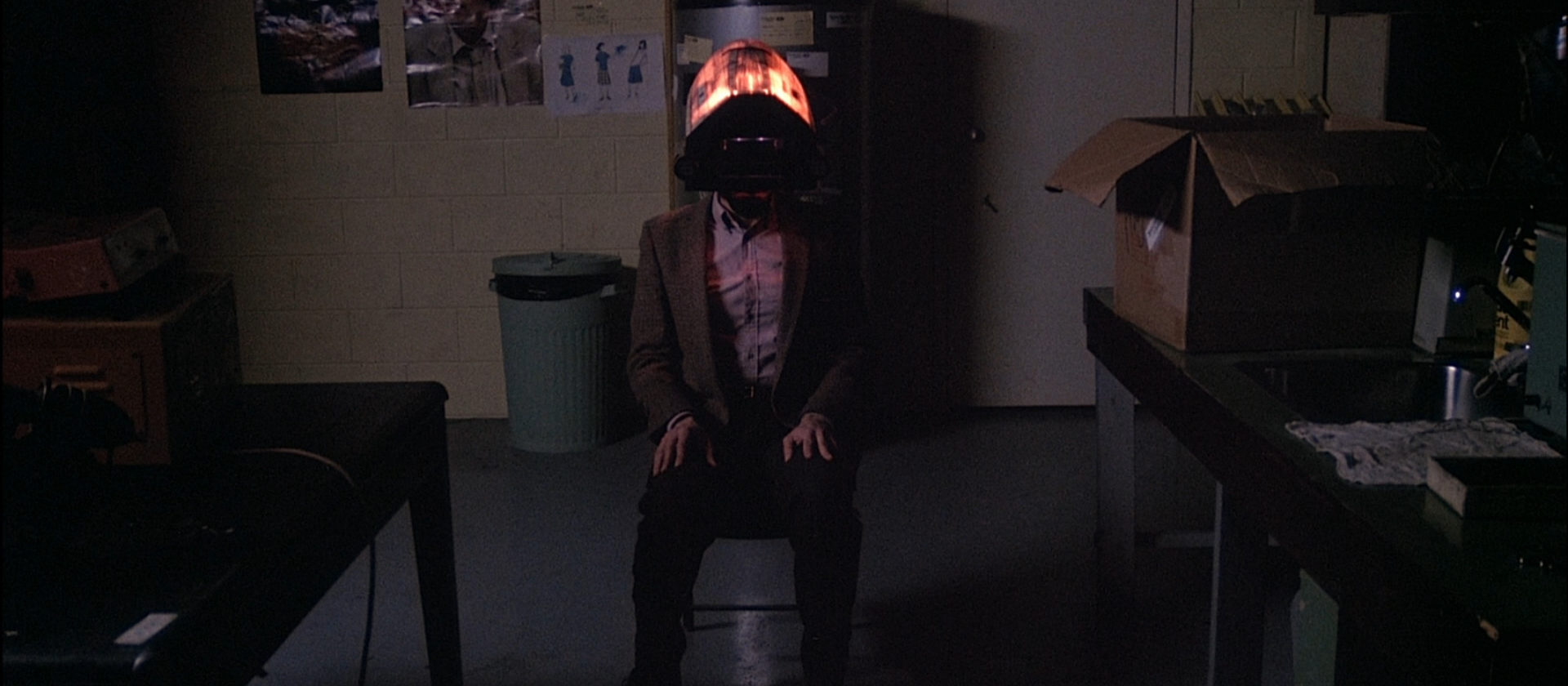
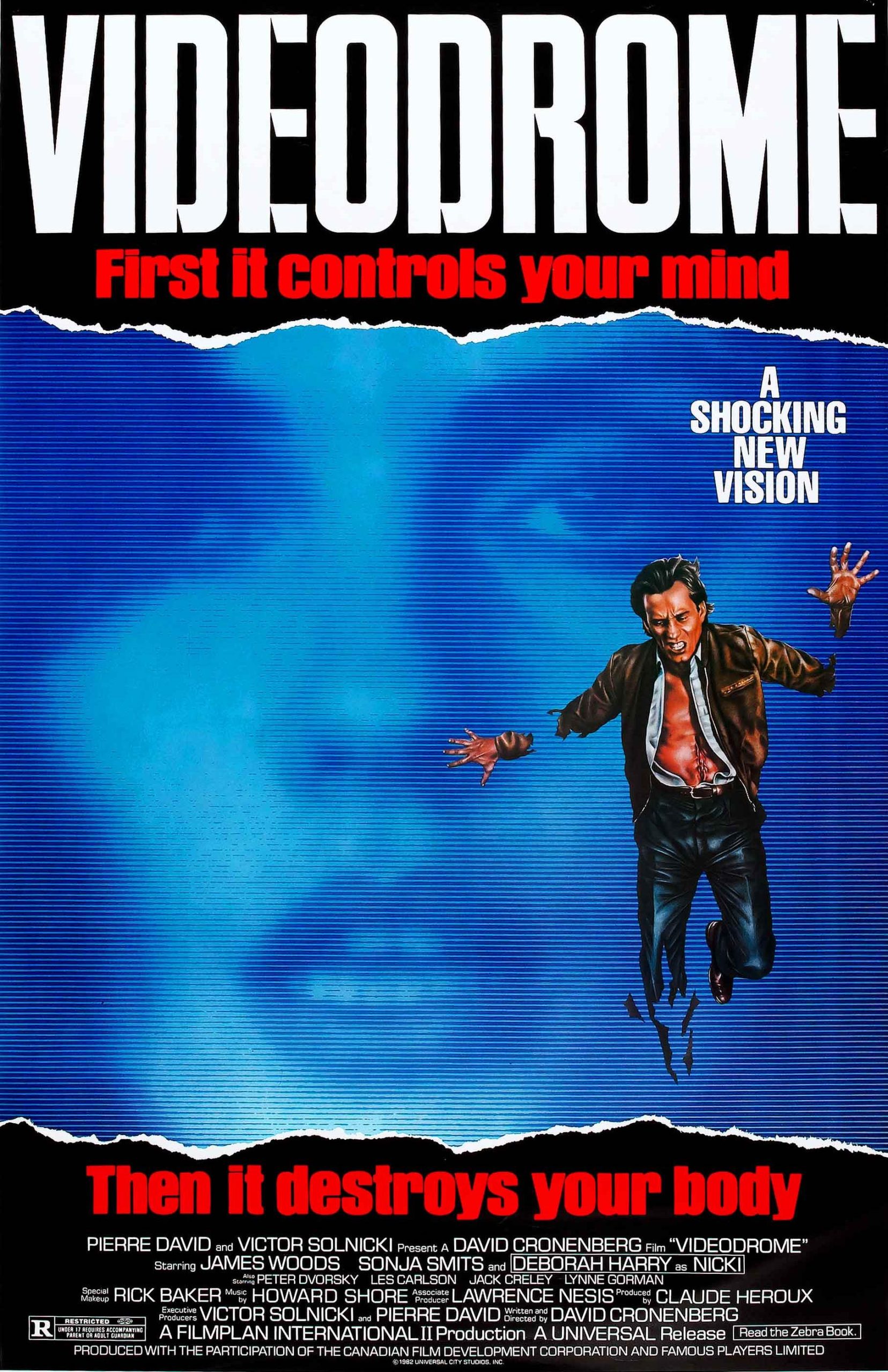
“They can program you. They can play you like a videotape recorder.”
David Cronenberg’s Videodrome does not hesitate to state its theme plainly. “The battle for the mind of North America will be fought in the video arena,” says Professor Brian O’Blivion (Jack Creley), a McLuhanesque “media prophet” who regularly appears on television via pre-recorded monologues. “The television screen is the retina of the mind’s eye. Therefore, the television screen is part of the physical structure of the brain. Therefore, whatever appears on the television screen emerges as raw experience for those who watch it. Therefore, television is reality, and reality is less than television.” He’s observed the debilitating effects of mindless television consumption, witnessed society’s growing reliance on (and obsession with) technology, noted the brain’s rewiring from the bombardment of sexualized imagery, and deduced that extreme audiovisual stimuli can fundamentally alter the individual’s reality. It can change how they perceive the world. In a very real sense, it can change who they are.
While that general insight is alarming enough on its own merits—especially once the viewer takes a step back and realizes that it applies equally to consumption of tamer material—Cronenberg’s creative exploration of the idea is absolutely breathtaking in its ghastliness. Consider how menacing and nasty horror films have become in the four decades since the film’s release. Videodrome is capable of setting the viewer’s teeth on edge with the best of them. Perhaps even more so, because it goes beyond jump scares and carnage to achieve its horrific effect. Rather, it wantonly violates our innate understanding of who we are as natural human creatures. Though it can be fairly described as incoherent, it provides ample justification for its distorted realities, and quickly riffs through such a surplus of ideas and images that one cannot help but take a few days to think over the film after seeing it. It also has a jet black sense of humor. In this way, it manages to remain viscerally compelling and deliriously indecipherable even as it promotes prolonged contemplation and thoughtful discourse. It’s a scintillating fusion of cerebral science fiction and grotesque body horror—a thinking man’s horror film, if you will, but one that absolutely passes the sniff test of your run-of-the-mill gorehound thanks to its special effects, grimy set design, and phantasmagoric atmosphere.
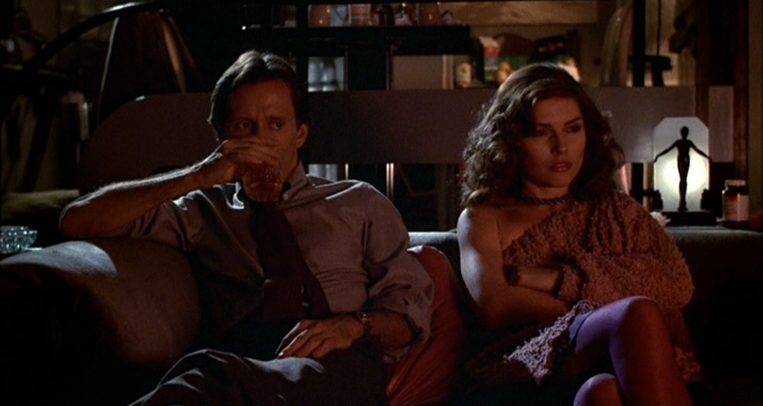
We first meet the aforementioned O’Blivion on the Rena King Show, where the hostess (Lally Cadeau) is interviewing him along with Max Renn (James Woods), the president of an independent cable station, and Nicki Brand (Debbie Harry, of Blondie fame), the host of a call-in radio show for the emotionally distraught. The topic of the conversation is the cultural desensitization to sex and violence, but the real target of the segment is Renn himself, whose Channel 83 broadcasts all sorts of debaucherous schlock—pornography, hardcore brutality, sadomasochism, whatever catches on with the midnight audience. Max initially defends his channel’s filth on economic grounds. “We’re small,” he says, “and in order to survive we have to give people something they can’t get anywhere else.” Pressed by Rena, who posits that his sordid shows have a hand in forming a milieu of moral decay and sexual malaise, he eloquently twists her question by suggesting that his seedy fare provides a societal benefit, offering viewers a harmless outlet for their most heinous fantasies.
But no matter how above it all Max might believe he is, however business-minded his consumption of vile footage, he cannot help but become entranced when his station’s pirate technician Harlan (Peter Dvorsky) stumbles upon a rogue broadcast of a plotless film that depicts the torture and murder of anonymous victims at the hands of masked butchers. This is Videodrome—O’Blivion’s television-as-mind-control notion taken to its odious extreme, the genuine snuff film. “Torture, murder, mutilation,” as Harlan describes it. Max is hooked, and tasks his colleague Masha (Lynne Gorman) with discovering the source of the transmission with an eye toward putting it on his own channel. Meanwhile, he becomes romantically involved with the masochistic Nicki, who falls under the influence of the filthy show to such a degree that she travels to Pittsburgh to audition for it.
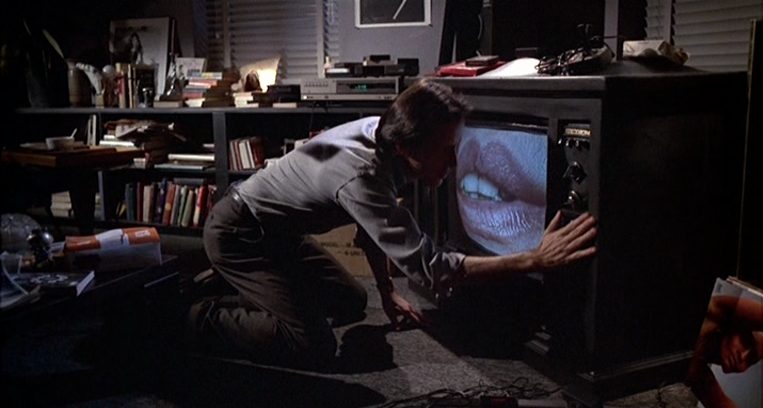
The trail of clues eventually leads Max to O’Blivion’s daughter Bianca (Sonja Smits) who runs the Cathode Ray Mission, an institution that offers private television access to vagrants, proving out the professor’s theories about the druglike effects of media consumption and ushering in his vision of the future in which people will physically merge with their technology. It’s Bianca who reveals the hideous truth to Max: that simply watching Videodrome initiates an irreversible physical response in the viewer in the form of a malignant tumor which causes ongoing hallucinations and opens the host up to enslavement of the mind through television signals. And since Max has already consumed the horrorshow several times, he can no longer trust his own senses. Indeed, seeing as he first glimpsed Videodrome only ten or so minutes into the film, the viewer must question the reality of everything that has transpired since. It is important to note, though, that the line between fantasy and reality does not particularly matter here; Max has not mistaken an illusion for reality—the illusion, however encompassing, has replaced his reality.
What follows is psychophysiological body horror par excellence as Max’s virtual and physical lives merge and morph into a chaotic blur of grotesque mutations, heinous acts of degeneracy, technological conspiracies, and exploding bodies. It takes the cerebral theories of new media philosophers and literalizes them in the most grotesque way possible. Max learns that O’Blivion has been dead for some time but “lives on” through a massive collection of tapes that he recorded leading up to his death; he dreams himself inside the wet clay cell where Videodrome is shot; Nicki disappears but then animates Max’s television, responding to his caresses with breaths and moans, humanizing the machine; he discovers Masha’s corpse in his bed, but then it disappears; a slit opens in his abdomen and he impulsively places a handgun inside of it, only to remove it later and find that the gun has merged with his hand; convulsing, fleshly video cassettes are inserted into his newly formed orifice.
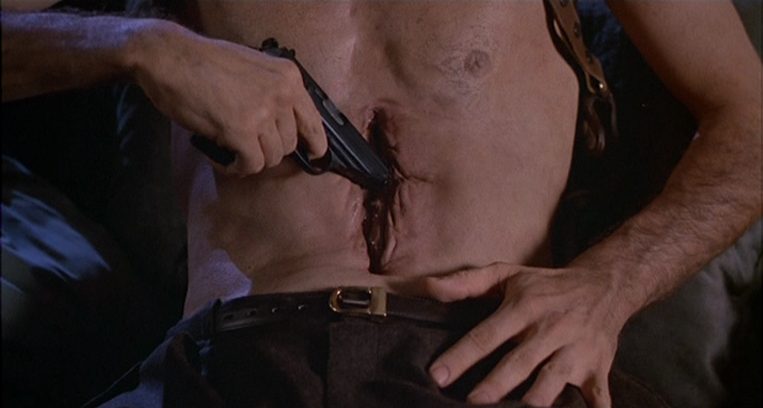
As I suggested, it’s impossible to reconcile this wild careening into any logical pattern. But that’s kind of the point, isn’t it? As Max’s technological tumor grows and causes his emotional distress to manifest as organic cyborg mutations, his experiences become increasingly fragmented, like a television junkie lost in the random flow of channel surfing, unable to integrate the overload of disparate sensory inputs into a coherent whole. His real life and his virtual life have become one, but the new paradigm is not cogent.
Ultimately, it doesn’t matter who is behind Videodrome or to what diabolical (or beneficent) end it is being used; it has utterly destroyed the lives of those it has touched, even if they do not realize it. By the end of the film, Max’s reality has warped considerably but subtly enough that he is willing to take drastic actions that would have been unthinkable prior to contracting the mind virus. In a day and age of pervasive and easily accessible pornography, snuff films, or even just moronic entertainment, where we all carry devices in our pockets that could pull up the slimiest filth with a few taps of the touchscreen, it is not in the least bit difficult to see the film as predictive of the insidious mutual codependence that has formed between our society and our technology, nor its dreadful influence. Even as I sit here clacking away at my keyboard, I find it difficult to envision my life without a computer. My laptop isn’t attached to me like Max’s gun, nor has it taken up residence inside of my body, but like a knight of old whose blade was an extension of his arm, I am attuned to my devices to an alarming degree.
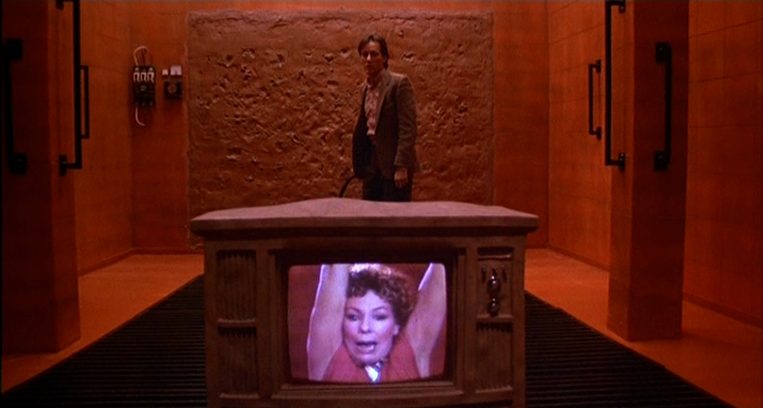
Though I’ve taken a stab at it, I don’t think Videodrome is the kind of film that can be accurately described by a single-angle approach. It is deliberately obscure, as complex and ambiguous as the landscape it seeks to explore. It warns against violent media, but is itself violent media. It casts a wary eye toward the union of man and machine, and yet exhibits a cautious fascination with the idea as well. But where many analysis-friendly films prove difficult for those simply looking for immersion, Videodrome is an eminently compelling experience. Just as Max cannot look away when Dr. Convex (Leslie Carlson) straps the hallucination helmet onto his head, so the viewer cannot turn away from the film’s paranoid phantasmagoria. It leaves us with a harrowing image as the conflict comes to a head within the literal head of our mutated hero, who holds an organic hand cannon to his own temple, finger poised on the trigger. Will his death usher in the age of the New Flesh, or will it bring down the entire apparatus of Videodrome? Has he entered a higher plane of existence or is he just copying something he saw on television? Or has the relationship between man and machine grown so intensely focused and all-consuming that the entire ordeal has been a virtual nightmare playing out within the darkness of Max’s apartment? “After all,” Professor O’Blivion says, “there is nothing real outside our perception of reality, is there?”